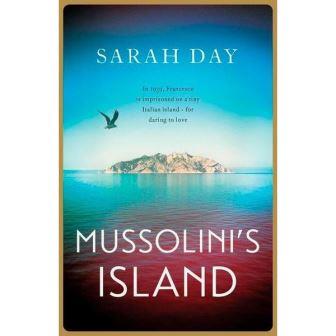
”It is a war,’ Emilio said quietly, as he always did. As though, somehow, that made everything right. As though, in war, people were allowed to become someone else entirely.’
In Sarah Day’s debut novel, ‘Mussolini’s Island’, it is 1939/1940 and war with other nations looms, but there are more immediate concerns for Emilio and his lover, Francesco.
What’s it about?
Love. Betrayal. Desire.
In Fascist Italy, Mussolini is insistent that men must be men and women must be women. Gay and bisexual men are considered weak and unable to fight, and are blamed for weakening Italy, particularly in relation to the infamous defeat at Caporetto, the source of a deep wound in the nation’s pride.
In Catania, Sicily, Police Chief Alfonso Molina decides these ‘degenerates’ are a ‘contagion’ which must be removed from the local population. Local police use informants to gather the names of the young men involved in homosexual acts and send them to a small island, San Domino.
Isolated on a strip of land that can be crossed end to end in one hour and forbidden to speak to the local population, the young men – referred to as “arrusi” – have little to do with their time but seek to discover who informed on them, while local guard, Pirelli, tries to found out which of them murdered a policeman back home…
Meanwhile, a young girl who feels equally trapped on the island is drawn to the prisoners despite warnings from her parents. Elena begins to pin her hopes for the future on handsome Francesco, but her fury when she discovers the truth about his nature leads her perilously close to a dangerous act…
What’s it like?
Quietly enthralling. Deeply sensual. Ultimately heart-breaking.
This is a fascinating insight into a dark period in Italy’s history. Day shows us men fighting for their lives in a war fought between state and self, in which the sense of self itself is threatened.
Francesco is confused, aware that he should repress his desires but ultimately unable to do so. He is determined to protect his mother, who has already suffered significant upheaval, but unwilling to leave his lover, Emilio. As the story develops over two time periods – life on the island and life just before the island – our understanding of his character evolves and we see the incredible pressures of society acting upon him and his cohort.
The slowly developing love story is carefully handled, with the potential for betrayal always visible as Day inches closer to the denouement.
In her keenness to anchor us in each time frame, Day can be a touch repetitive, reiterating Francesco’s key memories again and again, but this helps show the power they have for him.
Final thoughts
This is a gradually evolving insight into the pressures of living in a state that insists you are unacceptable and offers only one vision for the future. There are some key revelations towards the end which give a sense of closure, though we don’t know what will happen to the arrusi back in Catania.
There’s a real sadness permeating the ending which helps make it convincing, despite one or two rather unlikely coincidences.
This is a story to savour, taking your time to get to know Francesco as you learn more about his past.
Strangely, the characters who have lingered with me since I finished reading are Pirelli, man without a role, and Elena, trapped on the island. Perhaps it is as simple as not knowing what Francesco’s future holds, whereas Elena and Pirelli’s futures seem likely to be equally as confined as their lives to date.
This is a story which will stay in your mind for a long time after you finish the last page.


